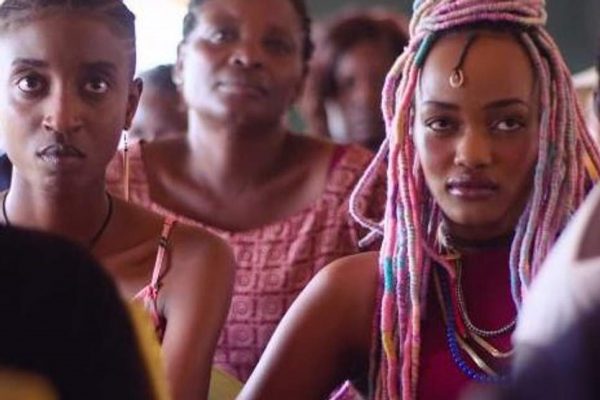@Filmhouse, Edinburgh from Mon 22 Apr 2019
The Kenyan teen lesbian romance Rafiki has come with built-in notoriety: initially banned at home due to, “its homosexual theme and clear intent to promote lesbianism in Kenya contrary to the law and dominant values.” The ban was lifted for a cursory week after it became the first film from the country to be selected for screening at Cannes. It’s clear the temporary volte-face was down to concerns over international PR than any concession to its themes. The film itself isn’t anywhere near as incendiary however, despite lovely, tender performances from its leads.
Rafiki is a Romeo and Juliet-style story about two young women in a lively community in Nairobi. They fall in forbidden love against the backdrop of a local election in which both their fathers are candidates. Kena (Samantha Mugatsia) is tomboyish and androgynous, while Ziki (Sheila Munyiva) is the more outgoing and flirtatious, her hair a great explosion of colourful braids. With homosexuality illegal in Kenya, the pair try to keep their liaisons a secret, mindful of the consequences should they be discovered.
Adapted by Kahiu and Jenna Cato Bass from a short story by Monica Arac de Nyeko, Rafiki overcomes schematic and conventional storytelling through a vivid sense of place and the sweet and believable chemistry from its two leads. Mugatsia’s Kena is especially compelling as the relationship triggers growth in all aspects of her life, and she finds confidence and strength as she needs it most. Kahiu depicts their moments of passion tactfully, wisely resisting explicitness and avoiding the sense of voyeurism that tarnished the similar scenes in Blue is the Warmest Color.
Besides the natural focal point of the two leads, Kahiu does a great job of peeling away the masks from previously lovable characters. This is exemplified by Mama Atim (Muthoni Gathecha) the proprietor of the soda stall which seems to serve as a social hub for the community. Her arc is truly sinister, as her gossiping morphs from quirky and avuncular to purely malicious. There are expected nods to religious hypocrisy and familial discord, but its the emergence of the hateful second Janus-face of the community that cuts deep.
This culminates in a harrowing scene of mob violence, edited as if chopped to pieces by a vengeful Struwwelpeter, to maximise the sense of shock, hurt and confusion. Up until this point, the film is marked by restraint, the physical threat only a background concern, which makes this sudden escalation all the more shocking.
More than a landmark LGBT film from the region, Kahiu and Rafiki are part of a wider movement of filmmakers whose films are an act of dissent in themselves, such as the guerilla filmmaking tactics of Haifaa al-Mansour (Wadjda) in Saudi Arabia or the puckish Jafar Panahi (This is Not a Film) defying a twenty-year ban from making movies in Iran. Separate from any considerations of quality, the face these works are being made at all – let alone that can be seen by a global audience – is something to be celebrated. They show the power of art to affect change.
On its own merits, Rafiki is a moving and luscious love story. It does have a ring of the over-familiar, but this is diluted somewhat by the vibrancy of its locations and the lilting sweetness of its central romance. At a lean 82 minutes, it doesn’t pad its simple story with needless tangents and Wanuri Kahiu certainly has an eye for a lush image.
